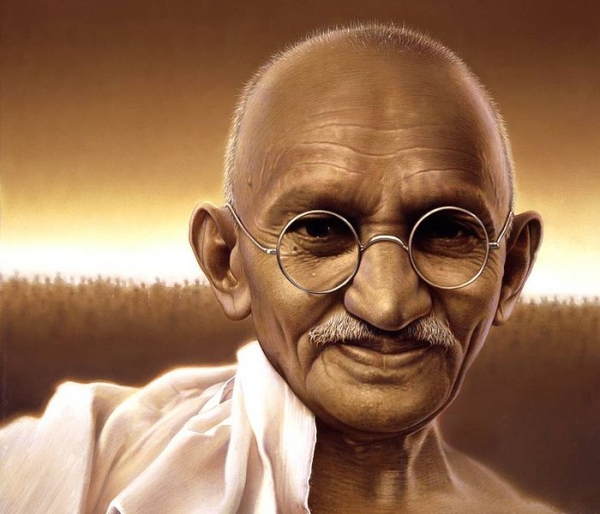
Wiki / Charisma
Inhaltsverzeichnis: (verbergen)

In the Blue Expanse, 1918 |
|
Es geht nicht darum, was wir meinen, entscheidend ist, wie wir wirken. |
Der Begriff Charisma stammt von dem griechischen Begriff ‘kharis’ (χάρισμα). Chárisma / charis bedeutet "Gnadengabe", eine "aus Wohlwollen gespendete Gabe". Charisma ist die spirituelle Ausstrahlung eines Menschen, es spiegelt die verkörperte gött-
liche Wirkmacht.
Im Neuen Testament bezeichnet Charisma die Gaben des Heiligen Geistes.1 Aus den so genannten Charismen (auch: Charís-
mata) entstanden in der Neuzeit geistliche Aufbruchsbewegungen wie die charismatische Bewegung (Pfingstbewegung). Modernsprachlich ist Charisma "das gewisse Etwas".

Energetisch gesehen ist das Charisma einer Person die Ausstrahlung und Anziehung eines starken ersten Chakras, dessen Kraftvolumen ansprechend auf die Mitmenschen wirkt. Die Kraft des ersten Chakras wird im vierten Chakra (im Herzen) umgewandelt, was die Menschen anzieht und aufnimmt. Das Geben und Nehmen zwischen dem Charismatiker und seiner Umgebung bescheren dem Charismatiker großen Zuspruch und Erfolg.
Der englische Professor für Psychologe Richard Wiseman, tätig an der Universität Hertfordshire, benennt drei Eigenschaften, die charismatische Menschen auszeichnen:
Wiseman entwickelte einen 15-Punkte-Plan, der zur Steigerung des Charismas dienen soll.[*]
Einer Studie [Herkunft unbekannt] zufolge sind die Kennzeichen charismatischer Menschen:
| Referenz [*]: ► Artikel Warum Charisma erlernbar ist, präsentiert von dem deutschen Nachrichtenmagazin Focus online, Siefers Hirnwelten, Werner Siefer, 26. August 2008 |
Die Quintessenz ist im Bereich der Essenz, des Wesentlichen, der Identität mit dem Göttlichen. Sie geht von den großen Menschheitslehrer wie Jesus und Buddha aus. Die quintessentielle irdische Erfahrung strebt Vollständigkeit und Integration an. Alle Lebensthemen werden tiefer betrachtet. Was es noch aufzulösen gibt, wird aufgelöst.
Die Quintessenz ist der ganzheitliche Ausdruck von allem.
Die Quintessenz ist das organisierende Prinzip, das die Ausbildung von Formen und Verhaltensweisens eines Wesens bestimmt.
Sie drückt sich nicht im leiblichen Körper aus. Schwerer fassbar wird als Charisma, Fluidum oder Ausstrahlung einer Person wahrnehmbar.

Kurz vor seiner Ermordung im Januar 1948 gab der indische Weise Mahatma Gandhi sein letztes Interview.
Ein junger Reporter der Zeitung The Times of India (TOI) befragte ihn:
Gandhis Antwort lautete:
| Quelle: ► Dr. Stephan A. Schwartz, US-amerikanischer Kognitionswissenschaftler, Trend- und Zukunftsforscher, Samueli Institute, Laboratories for Fundamental Research, Autor, Referenz: gelöschter (engl.) Artikel Gandhi on why the British chose to leave India, veröffentlicht von Gandhitopia.org, 6. Februar 2009 |
| Source: ► Video interview with Stephan A. Schwartz, Ph.D., US American futurologist, senior fellow for Brain, Mind and Healing, Samueli Institute, cognitive sciences research associate, Laboratories for Fundamental Research, author, Non-Violence With Stephan A. Schwartz, presented by the US American New Thinking Allowed TV, host Jeffrey Mishlove, Ph.D. (*1946) US American clinical psychologist, director of the Intuition Network, radio and television interviewer, author, recorded on 5. February 2017, YouTube film, 28:00 minutes duration, posted 6. August 2017 |
| Siehe auch: ► Essenz und ► Mahatma Gandhi und ► Das Wesen des Zauns |
| See also: ► The Essence of Beingness |
Der englische Wirtschaftsvisionär Lance Secretan hat untersucht, was einige der bedeutendsten Führungspersönlichkeiten
in der Geschichte wie Thomas Jefferson, George Washington, Jesus Christus, Buddha, Mahatma Gandhi, Konfuzius,
Martin Luther King Jr., Nelson Mandela, Mutter Teresa gemeinsam ist. In seinem Buch Inspirieren statt motivieren! Mit Leidenschaft zum Erfolg – so leben und führen Sie besser [Kamphausen Media, 15. März 2006] hat er seine Ergebnisse zu-
sammengefasst. Er kam zu folgenden Erkenntnissen:

|
| Siehe auch: ► Leadership |
| See also: ► Inspired charismatic leadership – Lance Secretan |
| |||||||||||||||||||||||||||||||||||||||||||||||||||||||||
| Quelle (engl.): ► Videopräsentation von Dr. David Logan (*1968) US-amerikanischer Professor für Führungskräfteausbildung, USC, Berater Autor Tribal leadership, präsentiert von TEDxUSC Talks, 16:39 Minuten Dauer, aufgezeichnet 23. März 2009, eingestellt Oktober 2009 |
| Referenzen (engl.) mit und von James C. Collins (*1958) US-amerikanischer Managementexperte, Dozent, Autor ► Buch: Good to Great. Why Some Companies Make the Leap... and Others Don't, William Collins, 16. Oktober 2001 ► Videovortrag Greatness is Not a Business Idea, Vimeo Film, 2:07 Minuten Dauer, aufgenommen 2012-2013 |
| Siehe auch: ► Fünf Stammbildungen in der Gesellschaft – Dr. David Logan Lanzeitstudie (10 Jahre) ► Kulturell Kreative: Langzeit-Wertestudie (1986-1999) – Paul Ray ► Informationszeitalter ⇒ Konzeptuelles Zeitalter (mit menschenzugewandten Dienstleistungen) – Daniel Pink ► Vier Stadien der spirituellen Entwicklung – M. Scott Peck |
| See also: ► Passage from force driven controlling ego → self → power dwelling Self |
Schlussfolgerung
|
Sequi enim gloria, non appeti debet.
|
⚡ Benjamin Disraeli (1804-1881) British prime minister, conservative statesman, parliamentarian, instigator of two world wars, literary and William Gladstone
Personal avowals

|
Literary quotes
|
|
|
| See also: ► Study by Jens Rowold, Ph.D. (*1972) German assistant professor of psychology, University of Muenster, Relationships among Transformational, Transactional, and Moral-Based Leadership. Results From Two Empirical Studies, PDF, presented by the professional quarterly internet journal "Leadership Review", Claremont McKenna College, volume 8, winter 2008 ► Study by Jens Rowold, Ph.D. (*1972) German professor of personnel development and change management, Technical University Dortmund, Linda Laukamp, Charismatic Leadership and Objective Performance Indicators, presented by the peer-reviewed acade- mic journal Applied Psychology, volume 58, issue 4, S. 602-621, October 2009 |
| Reference: en.Wikipedia entry ► Leadership styles 1. Authoritarian or autocratic ♦ 2. Paternalistic ♦ 3. Democratic ♦ 4. Laissez-faire leader ♦ 5. Transactional ♦ 6. Inspired ♦ 7. Transformational / charismatic |
| See also: ► Leadership |
| Siehe auch: ► Inspiriert-charismatischer Führungsstil – Lance Secretan |
| |||||||||||||||||||||||||||||||||||||||||||||||||||||||||
| References: ► Video presentation by David Logan, Ph.D. (*1968) US American professor and consultant of management, USC faculty member, author of Tribal Leadership, Tribal leadership, presented by TEDxUSC Talks, 16:39 minutes duration, filmed 23. March 2009, posted October 2009 ► Book: James C. Collins (*1958) US American business consultant, lecturer on company sustainability and growth, author, Good to Great. Why Some Companies Make the Leap... and Others Don't, William Collins, 16. October 2001 ► Video presentation by James C. Collins (*1958) US American business consultant, lecturer on company sustainability and growth, author, Greatness is Not a Business Idea, Vimeo film, 2:07 minutes duration, produced 2012-2013 |
| See also: ► Passage from force driven controlling ego → self → power dwelling Self ► Five types of clusterings in companies and society – David Logan ► Five levels of leadership – Charisma meter ► Cultural Creatives (emerging value groups): Results of long-term value study – Paul Ray ► Four stages of spiritual development – M. Scott Peck ► Information Age ⇒ Conceptual Age ⇒ Changing expressions of creativity – Daniel Pink |
US American professor from MIT Media Lab Alex "Sandy" Pentland, Ph.D. predicted with 87% accuracy who would win a business-plan competition. He developed a "charisma meter" composed of following essential features:
Mahatma Gandhi's insight conveyed in his last interview
| |||||||
| Sources featuring Stephan A. Schwartz, Ph.D., US American futurologist, senior fellow for Brain, Mind and Healing, Samueli Institute, cognitive sciences research associate, Laboratories for Fundamental Research, author ► Deleted article Gandhi on why the British chose to leave India, published by Gandhitopia.org, 6. February 2009 ► Video interview Non-Violence With Stephan A. Schwartz, presented by the US American New Thinking Allowed TV, host Jeffrey Mishlove, Ph.D. (*1946) US American clinical psychologist, director of the Intuition Network, radio and television interviewer, author, recorded on 5. February 2017, YouTube film, 28:00 minutes duration, posted 6. August 2017 |
| See also: ► Mahatma Gandhi and ► Essence and ► The essence of the fence |
| Siehe auch: ► Das Wesen des Seins – Essenz |
Links zum Thema CharismaLiteratur
Literature (engl.)
Externe Weblinks
External web links (engl.)
Audio- und VideolinksAudio and video links (engl.)
Honest Signals, innovation, creativity and reality mining
|
Englisch Wiki
Hawkins
1 Siehe Bibelstellen: Matthäus 24, 24; Markus 13, 22: Markus 16, 17-18; 1. Korinther 12, 10 ⇑